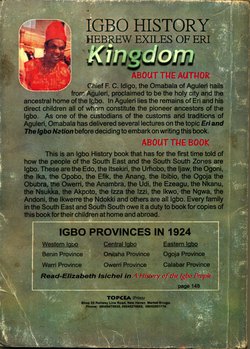Читать книгу Igbo History Hebrew Exiles of Eri - Omabala Aguleri - Страница 7
На сайте Литреса книга снята с продажи.
CHAPTER ONE ERI KINGDOM
ОглавлениеThe Kingdom of Eri is associated with the Kingdom of the entire Igbo race. Eri never had an empire of the size and status of Oyo, Benin, Sokoto and Kanem Bornu Empire. Instead, Eri Kingdom was founded on a banner of peace. There is not written record of a pronouncement on the mission of Eri to start the Igbo race in Eri-Aka in Aguleri, but Biblical account (Genesis 46: 16 and Numbers 26: 15) reveals that Eri was the son of Gad; who was the son of Jacob. During a great famine which occurred in Israel in the era of Jacob, Gad left Israel for Egypt, along with his father, Jacob, and his other brothers, and lived with their brother, Joseph when Joseph was the governor of Pharaoh’s Kingdom in Egypt. The Bible confirms that much later in history, the Israelites continued to live in bondage in Egypt.
Convincing arguments have been adduced that Eri must have migrated south of the Nile towards his destination, during the servitude of the Israelites in Egypt, because the excavated pottery and stone tools at the University of Nigeria, Nsukka, were found to be about 4500 years old (Isichei 1976). Furthermore, the excavations made in Anambra basin, the area of the early settlement of Eri, (Omoregie 1989), and this period coincided with the period of the Jewish captivity in Egypt. Also, archaeological evidence, which will be discussed in a later chapter of this book, had proved that Eri and Oduduwa migrated south of the Nile at about 3000 B.C. and during the metal age, when it was possible to use metal tool to exploit the rain forest of Nigeria. Eri was said to have moved down the Anambra River through Igala to found the Igbo race, while Oduduwa migrated to Ife to establish the Yoruba race.
Eri and his companions were not the only group of Hebrew Israelites who migrated from Israel into Igboland. Other migrations followed. The movements of Hebrew Israelites which gave rise to subsequent migrations were stated in the Bible and these movements were the result of God’s curse on them for their disobedience. Alaezi (1999) clearly stated as follows “they began about 718 B.C. when King Salmanza V of Assyria defeated Israel and drove away the inhabitants after rendering the entire land desolate. The Assyrian King brought in a large number of pagans from Assyria to occupy every inch of the land of the scattered Jews so as to blot out their identity as a people of God. However, two tribes, Judea and Benjamin out of the twelve tribes of Israel were left behind in their original places. The next scattering of the Hebrews in continuation of God’s plan was by the Babylonians under King Nebuchadnezzar’ first, in 536 B.C. and second in 586 B.C. The next and the last Gentile power used by God to scatter the people of Israel for their disobedience was the Roman Empire. In AD 70, the Roman General Titus drove away the remaining two tribes of Israel and the remnants of Hebrews or Israelites from their homeland into “the four corners of the earth” in final fulfillment of God’s curse on them (see Deuteronomy 28, Ezekiel 23).
“With this last scattering exercise by the Romans, about 700,000 Hebrews found themselves back to Egypt as a people in trouble. From Egypt, they moved to Tunisia, Syria, Iraq, Morocco, Libya, Sudan, and then to Sub-Saharan Africa, settling in their largest numbers in Nigeria.”
It can be seen that Eri-led migration laid the foundation for subsequent migrations of Hebrews Israelites into Igboland, as defined in this book. This is why history credited Eri as the founding father of the Igbo people of Nigeria, occupying the southeast and the South South zones of Nigeria.
As if the Kingdom of Eri was destined to be peacefully established, Aguleri oral tradition confirms that when Eri and his brethren landed at Eri-aka settlement, they met an uninhabited open country. They settled there till their population grew. After the death of Eri, his seven children and others also lived, died and were buried in Eri-Aka settlement. Five of the seven children and their own children and companions dispersed peacefully in family units into these uninhabited lands without a sword. This is the difference between Eri Empire and those mentioned above. The migrated family units became autonomous communities, and this accounts for the fact that before the Yoruba Prince Oranmiyan was invited to Benin, no centralized authority that existed after King Eri and King Agulu in Igboland exercised power over other communities. As mentioned, the only empire established with the sword was after the Yoruba son was invited by Benin to be their king.
Eri Kingdom was therefore founded on his fatherly relationship and influence with his descendants who from Eri settlement in Eri-Aka in the present Aguleri were well known to have had relative smooth population spread beginning from the fringes of Anambra Basin; to the axis of Nsukka in Enugu State; to Abakaliki and Afikpo in Ebonyi State; to Ogoja and Calabar of the south, south east of the Ikwerre and Ogoni and the Ijaw occupying the Rivers and Bayelsa to Warri to Sapele to Agbo in Delta State; and Benin to Auchi in Edo State.
